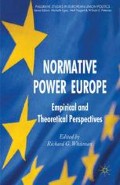Abstract
In spring 1994 I first heard Richard Whitman ask the question, ‘what is the international identity of the European Union?’. The end of the Cold War, the Treaty on European Union, and wars in Kuwait and the Former Yugoslavia all raised methodological, theoretical and empirical questions over the study of the European Union’s (EU) ‘international identity’ (Whitman 1994, 1996, 1998; Manners and Whitman 1998, 2003). In the 1990s and early 2000s I worked on projects studying the EU’s international identity, the foreign policies of EU member states, and the interplay between ‘English School’ international theory and European integration during the 1990s with Whitman and latterly Diez (see Manners and Whitman 2000; Diez 2001; Manners 2001, 2004; Whitman 2001; Diez and Whitman 2002). During this period it became increasingly clear to me that the study of the EU in world politics needed to engage with both critical social theory and normative international theory. My work on symbolism in European integration during the early 1990s suggested that EU studies needed to engage with social theories that took physical, performative and discursive symbolism seriously (Manners 2000b, 2005, 2011b). Here the work of Berger and Luckmann, Cohen, Searle and Calhoun is important in coming to terms with both social construction and critical social theory (see, for example, Cohen 1985; Calhoun 1995; Searle 1995; Berger and Luckmann 1996). At the same time, sharing an intellectual milieu with international political theorists such as Devetak, Cochran, Mandaville, Frost and Kinnvall suggested that EU studies also needed to engage with normative theories that took international, supranational and transnational politics seriously (see Kinnvall 1995, 2006; Frost 1996; Cochran 1999; Devetak 1999; Mandaville 2001).
’I am very grateful to Christopher Bickerton, Vicki Birchfield, Annika Björkdahl, Thomas Diez, Hiski Haukkala, Ana Juncos, Mary Martin, Jan Orbie, Michelle Pace, Michael Smith and Emma Stewart for their thoughtful contributions; as well as to Edward Keene, Catarina Kinnvall, Sarah Cormack Patton, Tuomas Forsberg, Arne Niemann and Elisabeth De Zutter for their critical reflections. My greatest thanks to Richard Whitman for this book.
Access this chapter
Tax calculation will be finalised at checkout
Purchases are for personal use only
Preview
Unable to display preview. Download preview PDF.
Editor information
Editors and Affiliations
Copyright information
© 2011 Ian Manners
About this chapter
Cite this chapter
Manners, I. (2011). The European Union’s Normative Power: Critical Perspectives and Perspectives on the Critical. In: Whitman, R.G. (eds) Normative Power Europe. Palgrave Studies in European Union Politics. Palgrave Macmillan, London. https://doi.org/10.1057/9780230305601_12
Download citation
DOI: https://doi.org/10.1057/9780230305601_12
Publisher Name: Palgrave Macmillan, London
Print ISBN: 978-1-349-36733-7
Online ISBN: 978-0-230-30560-1
eBook Packages: Palgrave Political & Intern. Studies CollectionPolitical Science and International Studies (R0)

